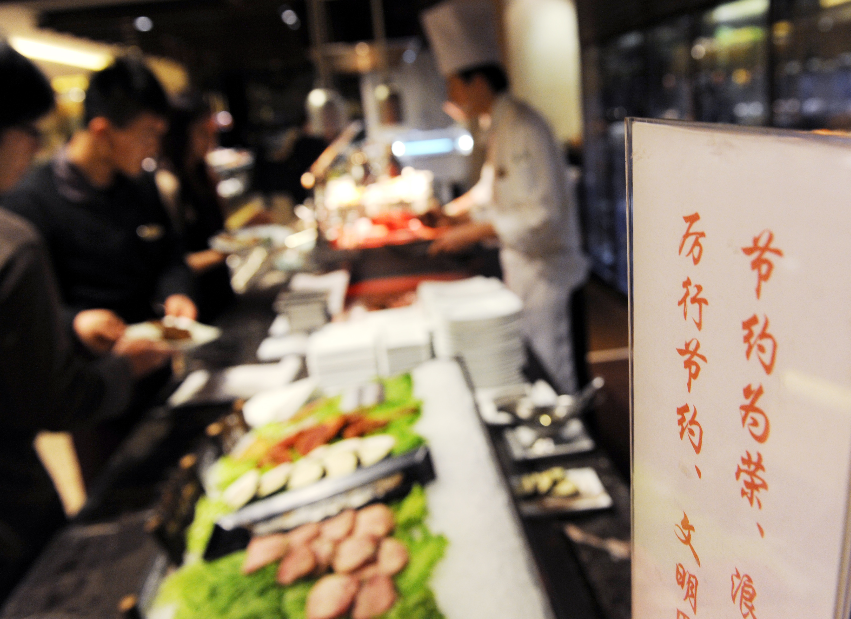BEIJING, Dec. 22 (Xinhua) -- Chinese lawmakers on Tuesday began deliberating a draft law on preventing food waste to ensure food security.
The 32-article draft was submitted to the ongoing session of the Standing Committee of the National People's Congress for its first reading.
The law is of great significance to promoting a healthy, rational, and green lifestyle and better consumption behavior. It is also essential to accelerating the construction of a resource-conserving and environmentally-friendly society. It will also aid sustainable economic and social development, according to the reasoning submitted to the session.
"CLEAR YOUR PLATE" CAMPAIGN
The issue of food waste has been of widespread concern in the country in recent years.
Since the 18th National Congress of the Communist Party of China, the government has been paying more attention to the issue, with policies issued and campaigns launched to curb food waste.
A nationwide "Clear Your Plate" campaign is gaining steam across the country, both online and offline.
Anti-food-waste posters and slogans are on the walls of many restaurants, and schools and universities have also joined the efforts to fight food waste.
Netizens share photos and videos of empty plates after finishing their food on social media platforms, where fighting food waste is among the hottest topics.
In order to establish a long-term mechanism to prevent food waste, lawmakers are now elevating the constructive policies and measures the country has adopted over the past years into the draft law.
GOVERNMENT DUTIES
The draft law specifies the responsibilities of the government concerning the fight against food waste.
Governments at all levels should exercise leadership over preventing food waste, improve work mechanisms, set targets, and intensify supervision and management, according to the draft.
Local governments above the county level should update the public on the developments in their anti-food-waste work every year and propose measures to step up the work, the draft reads. It added that they should support sci-tech research and development that will help conserve food.
China will enforce tax policies that will facilitate the fight against food waste, according to the draft.
The draft also stipulates the responsibilities of several State Council departments, ranging from making an overall work plan to tightening management and supervision of the catering industry.
DUTIES OF VARIOUS SECTORS
The draft law also requires government agencies, state-owned enterprises, and public institutions to toughen the management of banquets using public funds.
Catering service providers should adopt measures to minimize food waste, such as improving the management systems for food purchasing, storage, and processing. They should put up posters to remind consumers to refrain from ordering excessive food, says the draft, adding that they can charge consumers for obviously wasting food.
It calls on catering service providers to use technologies. Big data, for instance, would analyze the needs of consumers. It would lead to improved management of food purchases, transportation, and storage.
Online food delivery platforms should also display noticeable reminders on their food-ordering pages, and travel agencies are responsible for guiding travelers in saving food.
Individuals should serve or eat an appropriate amount of food at weddings, funerals, parties, and other events, as well as in daily life, according to the draft.
Food and catering industry associations should formulate anti-waste standards and rules for their members, the draft reads.
Schools should educate their students on practicing thrift and opposing waste, it says.
News media outlets are required to promote public awareness of preventing food waste, the draft says, banning them from producing, broadcasting, or spreading programs or audio-video clips on binge eating.
SUPERVISION, PUNISHMENT
The draft specifies that governments at all levels and relevant departments should set up supervision and inspection mechanisms to combat food waste. It urges those who waste food to rectify their misdeeds.
All units and individuals have the right to file complaints with administrative departments against food producers found to have wasted food, it adds.
Catering service providers inducing or misleading consumers into ordering excessive food that leads to obvious waste will be warned by market regulators. Those who refuse to make rectifications will be fined, according to the draft.
Radio stations, TV stations, and online audio-video service providers who produce, release, or spread content advocating gluttony will also receive a fine if they refuse to make corrections or commit serious violations. Regulators can suspend or shut down their services, the draft says.
A law on food security is also in the legislative work plan for the next year, and its drafting is underway. Enditem




 A single purchase
A single purchase









